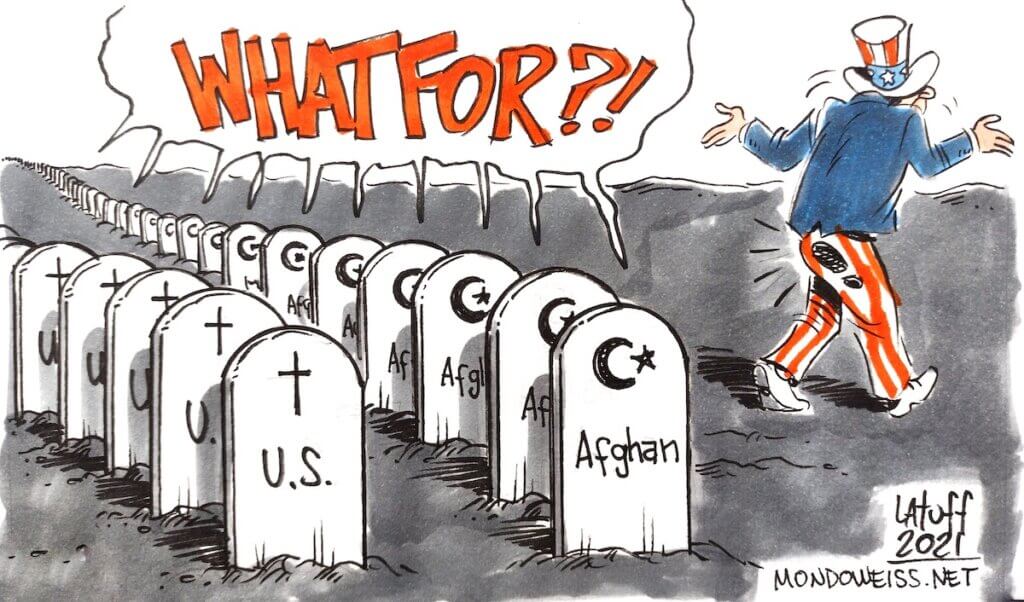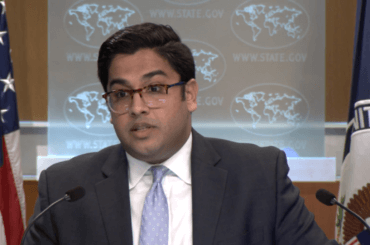Hope Dies Last
In his excellent new book Reign of Terror Spencer Ackerman reminds us that the Taliban offered the United States peace terms a few months after 9/11. The U.S. would have been negotiating at the height of its leverage, but Rumsfeld said no. I remember a Weekend Update joke on SNL at the time. Something like, “The United States declined the offer but admitted it was nice to laugh again.”
Twenty years later, who’s laughing? 71,000 Afghan civilians dead. 170,000 Afghan combatants killed. 2,000 American soldiers gone. Death on that scale isn’t cheap. It took $2.26 trillion in taxpayer money. The government that the United States spent two decades trying to prop up collapsed in a matter of days. That was entirely predictable for anyone paying close attention. The Taliban resurgence has been occurring for years, largely ignored by the mainstream media. Those terms that were regarded as comical in 2001? It’s basically what Trump failed to secure from the Taliban in 2019.
Biden’s speech defending withdrawal was a terrible exercise in imperial hubris. He implemented the same tired tropes about Afghans letting the U.S. down and framed the occupation as some benign attempt to establish democracy. Beyond Afghanistan his foreign policy has largely been terrible but credit where it’s due. He’s cleared the very low bar of declaring he was going to leave and actually following through with it. It’s something neither Obama nor Trump delivered on.
It was nearly impossible to trust much of what Trump used to say and his political vision seemingly shifted every other day but millions of people sincerely believed that Obama was going to reverse the awful policies of the Bush era. A month after Osama bin Laden was killed Obama declared that the United States was reaching its goals in Afghanistan and that he’d begin withdrawing troops.
And he did! In 2011 there were about 100,000 troops in Afghanistan and by March 2015 that number was down to 9,800. However, in 2016 he went back on his promise. Rereading the New York Times on the reversal is comical and devastating:
Mr. Obama cast his decision as a vote of confidence in Afghanistan’s government, led by President Ashraf Ghani, as well as in the support of NATO members and other partners, who have contributed 6,000 troops. But it also underscores the fact that American hopes of building an Afghan force capable of securing the entire country had fallen short.
That Times piece notes that John McCain and Lindsey Graham both supported Obama’s decision. It also quotes Massachusetts Rep. Jim McGovern: “We are engaged in what appears to be an endless war, with no strategy about how to end the conflict and disengage our troops.”
Obama didn’t just boost the war via troop levels. His ascent effectively neutralized an antiwar movement that had been reinvigorated under Bush. Professors Fabio Rojas and Michael Heaney detail this development in their great book Party in the Street: The Antiwar Movement and the Democratic Party after 9/11. Here’s Rojas explaining their argument to Jacobin in 2018:
The main argument that Michael and I propose in our book is that support for the antiwar movement overlapped with support for the Democratic Party. So, in other words, when people were coming out to protest, they were protesting the war and using it as an opportunity to protest George Bush and the Republican Party.
So what happens is when the party moves on — when the Democratic Party starts to get victories and they start getting elected to office — there’s less of a motivation. Those identities start diverging from each other.
People have to make the choice, maybe unconsciously, where they could say, “You know, I could keep protesting the war, but does that make Obama look bad? Is that an issue we want to avoid?” And in the case of the antiwar movement, partisan motivations and partisan identities won the day.
The primary evidence for this is that the size and composition of antiwar movement changed dramatically over the course of the 2000s. We surveyed about ten thousand protesters from 2004 to 2011. We also collected data on protest event size from various sources, such as the National Parks Service and various media outlets. We discovered that around 2004 and 2005, protests were relatively large, attracting hundreds of thousands of people. We also found that about 50 percent of the people we surveyed at these events claimed to be Democrats. By 2008, the size of the protests had collapsed, to hundreds of people, and only about 20 percent claimed to be Democrats.
The Bush administration always framed the “War on Terror” as some epic battle between Good and Evil. There was no nuance and no distinctions. This position was sold to a fearful public so it didn’t take a whole lot of work to, say, fabricate a connection between Al-Qaeda and Saddam Hussein. Obama’s vision was different. He was a critic of the Iraq War but not the overriding assumptions that fueled it. It’s worth revisiting his famous 2002 speech on that war. He makes his position quite clear:
I know that even a successful war against Iraq will require a U.S. occupation of undetermined length, at undetermined cost, with undetermined consequences. I know that an invasion of Iraq without a clear rationale and without strong international support will only fan the flames of the Middle East, and encourage the worst, rather than best, impulses of the Arab world, and strengthen the recruitment arm of al-Qaida. I am not opposed to all wars. I’m opposed to dumb wars.
This became the popular Democratic position of the time: Iraq was a dumb war and it was diverting attention from our noble battle in Afghanistan. Here’s hoping this belief finally died in Kabul.
I Scream, You Scream
Lawmakers continue to lose their minds over ice cream. The latest effort to stop Ben & Jerry’s comes from Florida Senator Rick Scott, whose state definitely doesn’t have any sort of public health crisis that should be occupying his time instead.
This week Scott sent a letter to Commerce Secretary Gina Raimondo asking for an investigation into an ice cream company. “I am writing to you in light of the decision by Ben & Jerry’s, an American company which is wholly owned by Unilever, to participate in a foreign boycott, banning sales of its ice cream in portions of Israel,” wrote Scott. “I am extremely concerned with Ben & Jerry’s anti-Semitic actions, and as the Office of Anti-boycott Compliance is under your jurisdiction, I am calling on the Department of Commerce to initiate an investigation into whether or not Ben & Jerry’s recent decision violates the Export Administration Act of 1969.”
Arizona has also launched a review into the Vermont business, which means eight states are taking a look at them. Seems unlikely that they’ll find anything worthwhile, unless they genuinely want their states’ weird Israel pacts weighed by a court of law.
420-1
After 9/11 the House voted 420-1 to approve Authorization for Use of Military Force and allow the president to target anyone potentially connected to the attack. The solitary no vote was from California Rep. Barbara Lee of course. Recently Lee said she doesn’t feel vindicated because she wishes she had been wrong. Her historic 2001 remarks from the House floor are worth revisiting this week:
Mr. Speaker, Members, I rise today really with a very heavy heart, one that is filled with sorrow for the families and the loved ones who were killed and injured this week. Only the most foolish and the most callous would not understand the grief that has really gripped our people and millions across the world. This unspeakable act on the United States has really — really forced me, however, to rely on my moral compass, my conscience, and my God for direction.
September 11th changed the world. Our deepest fears now haunt us. Yet, I am convinced that military action will not prevent further acts of international terrorism against the United States. This is a very complex and complicated matter.
Now this resolution will pass, although we all know that the President can wage a war even without it. However difficult this vote may be, some of us must urge the use of restraint. Our country is in a state of mourning. Some of us must say, let’s step back for a moment. Let’s just pause, just for a minute and think through the implications of our actions today, so that this does not spiral out of control.
Now I have agonized over this vote. But I came to grips with it today, and I came to grips with opposing this resolution during the very painful, yet very beautiful memorial service. As a member of the clergy so eloquently said, “As we act, let us not become the evil that we deplore.”
Odds & Ends
?? Vijay Prashad on the U.S. loss in Afghanistan and the return of the Taliban: “Not one of these wars—Afghanistan, Iraq, Libya—resulted in the creation of a pro-U.S. government. Each of these wars created needless suffering for the civilian populations. Millions of people had their lives disrupted, while hundreds of thousands of people lost their lives in these senseless wars. What faith in humanity can now be expected from a young person in Jalalabad or in Sirte? Will they now turn inward, fearing that any possibility of change has been seized from them by the barbaric wars inflicted upon them and other residents of their countries?”
? Florida activists are pressuring Tampa General Hospital to divest from a recent partnership with Israel.
?? War criminal says he’s sad, remains at large.
?? From Reuters: “Video and pictures published by the Taliban on Twitter and elsewhere show fighters carrying M4 carbines and M16 rifles discarded by Afghan army units. Other images show Taliban forces capturing abandoned government vehicles.”
?? At In These Times Sarah Lazare says we can’t let the architects of the Afghanistan war define its legacy: “We mustn’t let the Boltons and Petraeuses of the world get the final say on what we have learned from the Afghanistan War, the horrors of which are still being born by people in Afghanistan. Instead, media bookers and writers seeking comment should perhaps seek out voices who didn’t lie about the war they’re now providing commentary on. Generals and commanders and pro-war national security advisors will only ever see the problem as not enough war, mistaking the occupation’s biggest indictment — that the Afghan government fell so quickly, lacking a shred of legitimacy or political will — as a sign that we need a protracted U.S. military presence.”
? Palestine Legal’s Amira Mattar on Ben & Jerry’s in The Nation: “Israel’s visceral reaction to Ben and Jerry’s announcement to withdraw from the Occupied Palestinian Territory reveals that it will go after even those who attempt to distinguish Israel inside the Green Line from its illegal settlements—a line that Israel itself has blurred physically and economically (and a blurring the United States has furthered). Israel passed a law imposing penalties on boycotters of Israel and areas it controls, including the illegal settlements. The settlements themselves are so thoroughly intertwined with Israel’s market that it is practically impossible to pull out from selling products in the Occupied Territory without ending ties with Israel altogether—an ironic, self-inflicted consequence of trying to fortify a single state based on supremacy, spanning from the river to the sea.”
? I wrote about how mainstream journalists aren’t allowed to express their opinions unless they’re pro-war.
? Students headed off to college should be wary of BDS hip hop clubs. One can never be too careful.
Stay safe out there,
Michael


